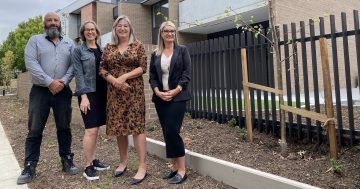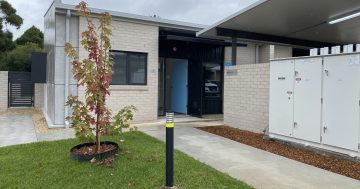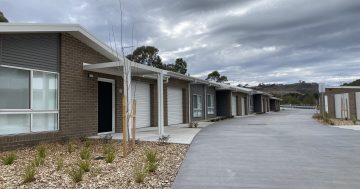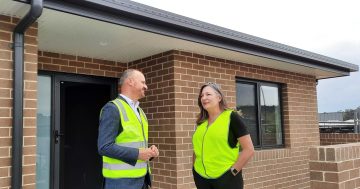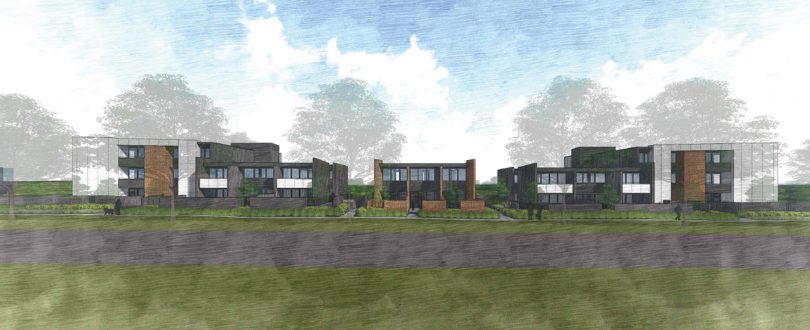
An artist’s impression of the public housing properties to be built in Dickson. Image: ACT Government.
Construction has begun on an additional 21 public housing properties in Dickson as a part of the ACT Government’s renewal program.
The mix of two and three-storey buildings will contain two, three and four-bedroom apartments, as well as two-bedroom town houses.
The minimum 6-star energy efficiency and Gold Class or Class C Adaptable homes will replace six properties on Morphett Street.
Speaking at a sod-turning event on the site, Housing Minister Yvette Berry said the Dickson development continued the program’s focus on improving public housing through the renewal of older, less efficient homes and increasing the number of properties that are designed and built to provide more choice and meet the different needs of tenants.
She said it had been designed to consider the best use of the area and block size to create a sense of space and privacy between homes and neighbours.
“The Growing and Renewing Public Housing program is increasing the portfolio’s flexibility to support the provision of safe, secure and sustainable homes that are close to services and transport for more people in need, regardless of their abilities or circumstances,” she said.
Ms Berry said there would be a range of people with different needs living in the complex which should be completed by the middle of next year.
She said all dwellings would have wider accessible doorways, the Class C homes would allow people to age in place and others would be fully accessible to accommodate wheelchairs.
There is a long wait for public housing in the ACT with more than 2700 on the waiting list – more than 1600 with high needs, nearly a 1000 needing standard homes and almost 200 assessed as priority.
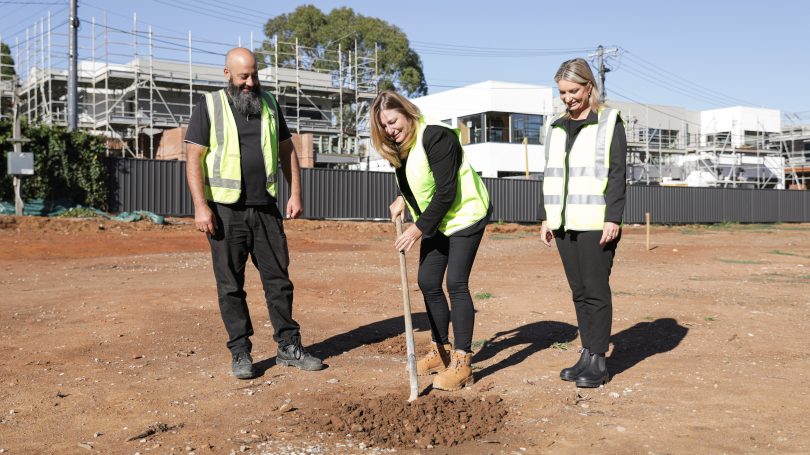
Yvette Berry turns the first sod on the Morphett Street public housing project in Dickson. Looking on is Executive Branch Manager, Housing ACT Catherine Loft, and Managing Director ABA Construction, Mohammed Wazir. Photo: Supplied.
The average waiting times, according to the Community Services Directorate website, are 1340 days for standard housing, 867 for high needs and 267 for priority.
The government continues to come under fire for not doing enough to make a dent in these demoralising figures but Ms Berry insists the ACT continues to punch above its weight, although she says the government can always do more.
Ms Berry said that by the end of the program 20 per cent of the ACT’s stock will have been renewed.
“We have some of the oldest public housing stock in country so we want to make sure that these homes in the ACT meet the needs of people now but also as they age in the future, ensuring they’re available for those who might have difficulties and needs for more accessible housing as well,” she said.
Ms Berry said the ACT spent more per capita on public housing than any other state or territory and had always called for the federal government to do more.
“If there was skin in the game from federal government in providing additional financial support, I could see that across the country we would have more affordable housing for people who need it most,” she said.
Ms Berry said the current program was also focused on building quality homes that were more sustainable and easier to maintain, something that would reduce the government’s upkeep bills.
The government says the Growing and Renewing Public Housing program will deliver 1000 homes that are more modern, high quality and efficient to help improve the quality of life for tenants.
But welfare groups such as the ACT Council of Social Services say that there is a shortfall of 3000 affordable dwellings in the ACT and skyrocketing rents and low vacancy rates are making the situation worse.












